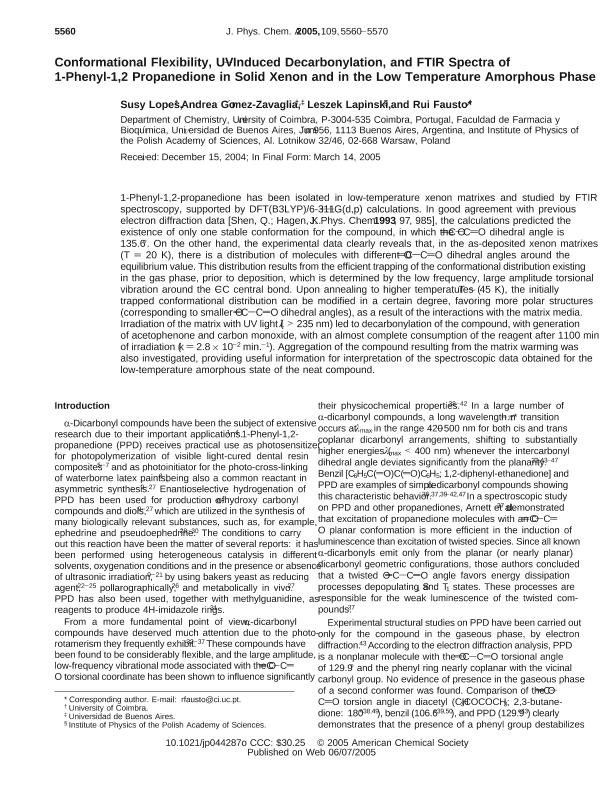Artículo
Conformational Flexibility, UV-Induced Decarbonylation and FT-IR Spectra of 1-Phenyl-1,2 Propanedione in Solid Xenon and in the Low Temperature Amorphous Phase
Fecha de publicación:
06/2005
Editorial:
American Chemical Society
Revista:
Journal of Physical Chemistry A
ISSN:
1089-5639
e-ISSN:
1520-5215
Idioma:
Inglés
Tipo de recurso:
Artículo publicado
Clasificación temática:
Resumen
1-Phenyl-1,2-propanedione has been isolated in low-temperature xenon matrixes and studied by FTIR spectroscopy, supported by DFT(B3LYP)/6-311++G(d,p) calculations. In good agreement with previous electron diffraction data [Shen, Q.; Hagen, K. J. Phys. Chem. 1993, 97, 985], the calculations predicted the existence of only one stable conformation for the compound, in which the O=C-C=O dihedral angle is 135.6 degrees. On the other hand, the experimental data clearly reveals that, in the as-deposited xenon matrixes (T = 20 K), there is a distribution of molecules with different O=C-C=O dihedral angles around the equilibrium value. This distribution results from the efficient trapping of the conformational distribution existing in the gas phase, prior to deposition, which is determined by the low frequency, large amplitude torsional vibration around the C-C central bond. Upon annealing to higher temperatures (T approximately 45 K), the initially trapped conformational distribution can be modified in a certain degree, favoring more polar structures (corresponding to smaller O=C-C=O dihedral angles), as a result of the interactions with the matrix media. Irradiation of the matrix with UV light (lambda > 235 nm) led to decarbonylation of the compound, with generation of acetophenone and carbon monoxide, with an almost complete consumption of the reagent after 1100 min of irradiation (k = 2.8 x 10(-2) min.(-1)). Aggregation of the compound resulting from the matrix warming was also investigated, providing useful information for interpretation of the spectroscopic data obtained for the low-temperature amorphous state of the neat compound.
Palabras clave:
FTIR
,
Matrix isolation
Archivos asociados
Licencia
Identificadores
Colecciones
Articulos(CIDCA)
Articulos de CENTRO DE INV EN CRIOTECNOLOGIA DE ALIMENTOS (I)
Articulos de CENTRO DE INV EN CRIOTECNOLOGIA DE ALIMENTOS (I)
Citación
Lopes, Susy; Gomez Zavaglia, Andrea; Lapinsky, Leszek; Fausto, Rui; Conformational Flexibility, UV-Induced Decarbonylation and FT-IR Spectra of 1-Phenyl-1,2 Propanedione in Solid Xenon and in the Low Temperature Amorphous Phase; American Chemical Society; Journal of Physical Chemistry A; 109; 25; 6-2005; 5560-5570
Compartir
Altmétricas




